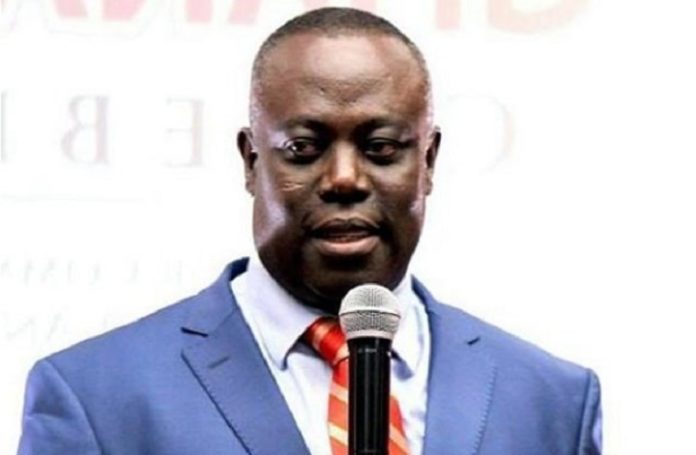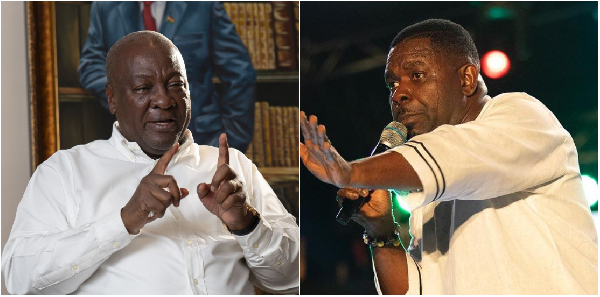PHOTOS: Kofi Annan died from ‘pneumonia’-Aide
The Late Kofi Annan
A former Policy Advisor who was also Director of Communications for Kofi Annan whilst he was at the UN Mr. Edward Mortimer has told the BBC that the Former Ghanaian diplomat died from “pneumonia”.
According to Mr., Edward Mortimer who has been throwing some light on what the former UN General Secretary was suffering from said, Mr. Kofi Annan was in good health until the last two weeks.
According to him, Mr. Annan suffered from “pneumonia” and did not quite give the family the opportunity to prepare for his death.
Describing the late Annan as an “extraordinary” man Edward Mortimer said at no point did he see him angry or raise his voice.
Ghana and the rest of the international community last Saturday woke up to news of the death of Kofi Annan aged 80. He died in Bern, Switzerland at the hospital on Saturday, 18 August.
Meanwhile, the funeral arrangement of the late UN Secretary General, Kofi Annan, will be announced after the Asantehene is formally informed about his passing.
His family members here in Ghana say they will meet Otumfuo Osei Tutu II this week as tradition demands because Kofi Annan was one of his chiefs.
Government has directed that flags at all state institutions should fly at half-mast in memory of the late statesman.
President of Ghana, Nana Addo Dankwa Akufo-Addo has visited the family of the late Secretary General of the United Nations, Kofi Annan, to commiserate with them.
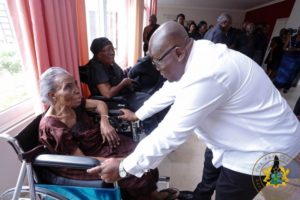
President Nana Akufo-Addo commiserating with Mr Annan’s family
President Nana Akufo-Addo signed a book of condolence in honour of late former UN Secretary-General Kofi Annan.
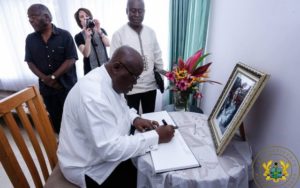
President Nana Akufo-Addo signing a book of condolence in honour of late former UN Secretary-General Kofi Annan
Nana Akufo-Addo wrote in the book: “A great Ghanaian who served his country, Africa and humanity with dignity and humility, has left us to join his Maker. Ghana has suffered a great loss from his passing. He brought great renown to our nation, and it is my wish that our nation honours him fully on his passing. God bless him and grant him a peaceful place of abode in his bosom.”
Former president of the Republic of Ghana, John Agyekum Kufuor, has described the former United Nations (UN) Secretary-General, Kofi Annan, as a true statesman.
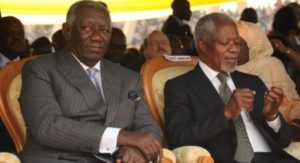
Mr Jon Agyekum Kufuor with the late Kofi Annan
Speaking to newsmen Monday, Mr Agyekum Kufuor said the late Kofi Annan was created purposely to serve the world which he managed to accomplish most of them.
Biography
Kofi Atta Annan was born in Kumasi on April 8, 1938. Since 1960 Ghana has been a republic within the British Commonwealth, a group of nations dependent on Great Britain. Named for an African empire along the Niger River, Ghana was ruled by Great Britain for 113 years as the Gold Coast. Annan is descended from tribal chiefs on both sides of his family. His father was an educated man, and Annan became accustomed to both traditional and modern ways of life. He has described himself as being “atribal in a tribal world.”

After receiving his early education at a leading boarding school in Ghana, Annan attended the College of Science and Technology in the capital of Kumasi.
At the age of twenty, he won a Ford Foundation scholarship for undergraduate studies at Macalester College in St. Paul, Minnesota, where he studied economics. Even then he was showing signs of becoming a diplomat, or someone skilled in international relations.
Annan received his bachelor’s degree in economics in 1961. Shortly after completing his studies at Macalester College, Annan headed for Geneva, Switzerland, where he attended graduate classes in economics at the Institut Universitaire des Hautes Etudes Internationales.
As the Secretary-General, Annan reformed the UN bureaucracy; worked to combat HIV, especially in Africa; and launched the UN Global Compact. He has been criticized for not expanding the Security Council and faced calls for resignation after an investigation into the Oil-for-Food Programme.
After leaving the UN, he founded the Kofi Annan Foundation in 2007 to work on international development. In 2012, Annan was the UN–Arab League Joint Special Representative for Syria, to help find a resolution to the ongoing conflict there.
Annan quit after becoming frustrated with the UN’s lack of progress with regard to conflict resolution. In September 2016, Annan was appointed to lead a UN commission to investigate the Rohingya crisis.
His work at the UN
Kofi Annan joined the UN in 1962, working for the World Health Organization’s Geneva office

He went on to work in several capacities at the UN Headquarters including serving as the Under-Secretary-General for peacekeeping between March 1992 and December 1996.
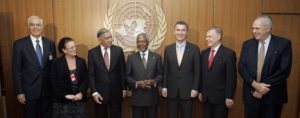
The Late Kofi Annan at UN Conference
He was appointed as the Secretary-General on 13 December 1996 by the Security Council, and later confirmed by the General Assembly, making him the first office holder to be elected from the UN staff itself.
He was re-elected for a second term in 2001, and was succeeded as Secretary-General by Ban Ki-moon on 1 January 2007.

The Late Kofi Annan with immediate UN Boss Ban Ki Moon
As the Secretary-General, Annan reformed the UN bureaucracy; worked to combat HIV, especially in Africa; and launched the UN Global Compact.

The Kofi Annan with Current UN Secretary-General Antonio Guterres
He has been criticized for not expanding the Security Council and faced calls for resignation after an investigation into the Oil-for-Food Programme.
After leaving the UN, he founded the Kofi Annan Foundation in 2007 to work on international development.
In 2012, Annan was the UN–Arab League Joint Special Representative for Syria, to help find a resolution to the ongoing conflict there.
Annan quit after becoming frustrated with the UN’s lack of progress with regard to conflict resolution.
In September 2016, Annan was appointed to lead a UN commission to investigate the Rohingya crisis.
Early career
Following his graduate studies in Geneva, Annan joined the staff of the World Health Organization (WHO), a branch of the United Nations. He served as an administrative officer and as budget officer in Geneva.
Later UN posts took him to Addis Ababa, Ethiopia, and New York City, New York. Annan always assumed that he would return to his native land after college, although he was disturbed by the unrest and numerous changes of government that occurred there during the 1970s.
Annan became the Alfred P. Sloan fellow at the Massachusetts Institute of Technology. At the end of his fellowship in 1972, he was awarded a master of science degree in management. Rather than return to Ghana upon graduation, he accepted a position at the UN headquarters in New York City.
Source: Ghana/otecfmghana.com



